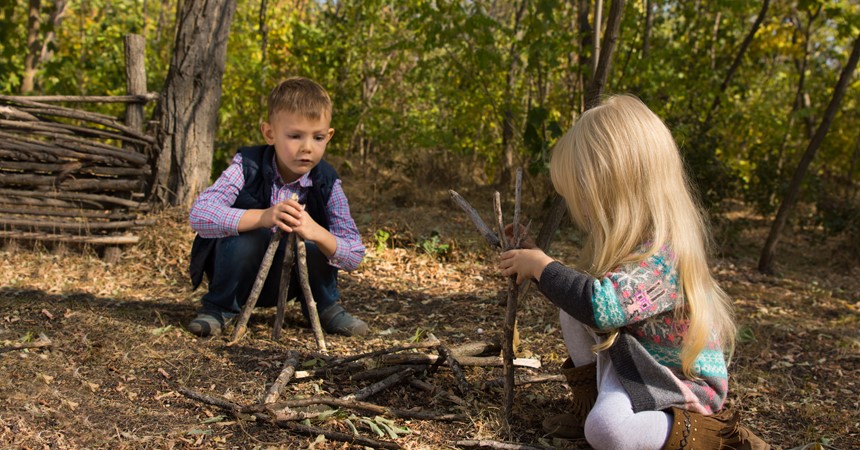In this article, Kim Moroney who is the Education Officer-Early Learning at the Catholic Schools Office in the Diocese of Maitland-Newcastle explains how educators, parents and carers can help to mitigate the negative impact of the COVID-19 pandemic by incorporating play into home learning routines.
Recognising the power of play is not new. Athenian philosopher, Plato, praised its virtues as a means of developing skills for adult life. Meanwhile, Albert Einstein, noted 'play is the highest form of research' and denoted its worthiness of further exploration.
In more recent times, the United Nations developed policies defending children's right to play. Today, the importance of play is attracting increasing national and international research, with formal evidence mounting to support its crucial role in contributing to better outcomes for children, not only for their learning but, in equal measure, their wellbeing.
Skills and processes recognised as vital components of modern learning, such as critical thinking, collaboration, problem-solving, social interactions, emotional regulation and creativity, are all linked to playing.
While literacy and numeracy are ever-present in play, children also experience joy, fun, awe, curiosity, and freedom to imagine and take risks. Play supports physical development and mental resilience, which is much needed in a complex, constantly changing world. Through play, children can safely make sense of their concerns and explore their wonderings.
The power of play to support and nurture children's healthy development, wellbeing, and learning during times of crisis is also well documented. Research from neuroscience and child psychology fields show children manage their stress and express their emotions through play.
While children may not watch the news directly, they are aware of current events and sense the concern. They pick up cues, tensions, and emotions from the adults in their lives. If given the opportunity, play provides children control over happenings they seek to understand.
Play at home is powerful in giving children the permission, time and space to play every day.
Indoor and outdoor opportunities for play are always close at hand and do not need to involve a large selection of commercial toys. In fact, the more open ended the resources are for children to access in play, the more creative and complex it becomes.
These resources, also commonly referred to by educators as "loose parts" include; sand, water, clay, scarves, string, masking tape, feathers, sticks, cardboard boxes/cylinders, chalk, paint, wooden blocks, mud, dirt, rocks, beads, shells, rope, pipes, pegs, puppets, glue, paper, pens, bark, flowers, ribbon, nets, sheets, kitchen utensils…the list goes on!
According to research by the UNSW Gonski Institute for Education, the best form of play is free, unstructured outdoors play- though indoor play is still significant. Being outdoors provides physical and mental health benefits including a connection with nature and the environment and increased movement. For children, nature and green space are exciting places full of magic, learning, adventure and fun.
There are many ways that children can interact with nature while adhering to current social distancing requirements. It's also important to note that parents who value play gain confidence in their ability to support their children's learning, monitor wellbeing and build closer relationships with them.
The power of play reframes restrictions into possibilities and opportunities enabling children to connect to others and the environment.
Through play, we demonstrate trust in children by valuing their capabilities, interests, theories and emotions. The power of play acknowledges the uniqueness of each child and their unique relationships with the adults in their lives.
So now we know this for sure, it's up to all of us adults, particularly parents, educational professionals and policymakers, to promote and protect children's right to play, particularly during a pandemic.
Ideas for encouraging play:
- No need to throw out your recyclable boxes and toilet rolls – keep a collection and have a household challenge to see what can be made by taping, sticking and tying the
“rubbish” together. - An outdoor scavenger hunt brings with it fresh air but is in fact a collection of “loose parts” that can lead to more play and creativity. Make a list of things in your natural environment to find and then discover what you can make from the collection of twigs, leaves and flowers.
- Make a mud kitchen in your backyard – you might think this is one for the younger children, but children of all ages delight in mixing and creating in a garden area.
- Dress ups – don’t worry if you don’t have an abundance of dress up costumes as they can restrict the imagination. Items such as scarves, hats, shirts, skirts, bags etc are more open ended. Can your children adorn your shoes or an adults’ clothes for a bit of fun?
- Word games, old school board games, reading together, drawing, painting, recounting stories, baking, gardening, singing and dancing are all playful experiences which can be enjoyed by the family.
























































































